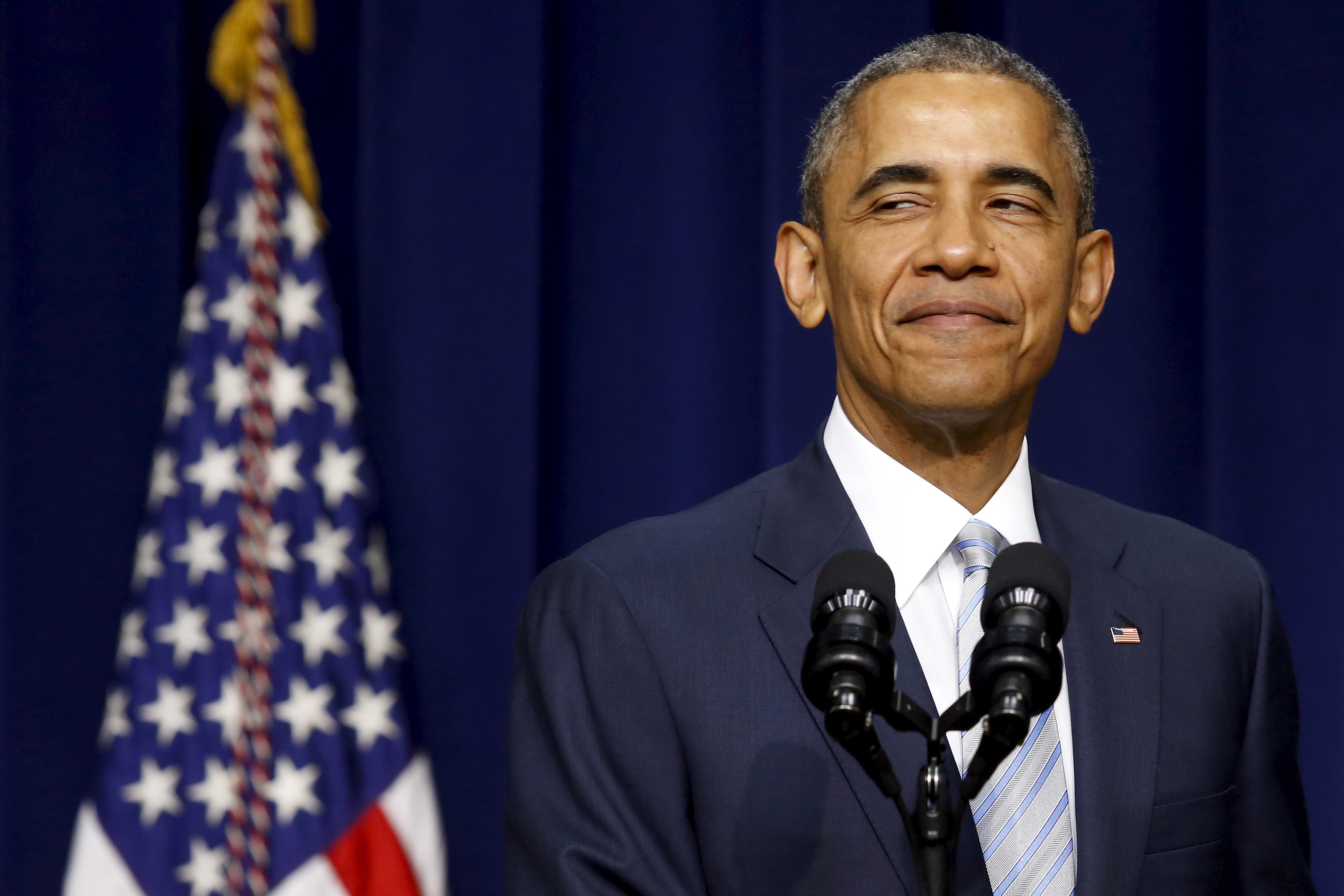It's time for the GOP to move on from attacking Obama
It doesn't matter whether they say he's incompetent or extreme. What Republicans really need is to stop talking about him altogether.


A free daily email with the biggest news stories of the day – and the best features from TheWeek.com
You are now subscribed
Your newsletter sign-up was successful
Once again, Republicans seem downright obsessed with Barack Obama.
Sen. Marco Rubio (R-Fla.) has spent plenty of campaign time, and no small amount of airtime in the debates, attacking the president and his track record. Rubio's messaging has focused on positioning Obama as an extremist who wants to "fundamentally transform" America from its traditional values toward a progressive agenda. Other candidates have attacked Obama for incompetence, but Rubio insists that's a mistake.
In fact, he repeatedly insists that it's a mistake. During Saturday night's debate, Rubio twice said, "Let's dispel with this fiction that Barack Obama doesn't know what he's doing. He knows exactly what he's doing." Rubio started a third repetition of the line but got interrupted by New Jersey Gov. Chris Christie, who ripped it as "a memorized 25-second speech." Undaunted, Rubio got the message line in once more during the debate, and later pledged to keep using it.
The Week
Escape your echo chamber. Get the facts behind the news, plus analysis from multiple perspectives.

Sign up for The Week's Free Newsletters
From our morning news briefing to a weekly Good News Newsletter, get the best of The Week delivered directly to your inbox.
From our morning news briefing to a weekly Good News Newsletter, get the best of The Week delivered directly to your inbox.
"That's what I believe passionately," Rubio later told ABC's George Stephanopoulos. "It's one of the reasons why I'm not running for re-election to the Senate and I'm running for president. This notion and this idea that somehow all this is an accident — ObamaCare was not an accident, Dodd-Frank was not an accident, the deal with Iran was not an accident."
Most observers felt Rubio came off poorly in the exchange with Christie, but others found Rubio's messaging solid. No less a conservative authority than Rush Limbaugh defended Rubio on Monday. "The governors will not admit who Obama is," Limbaugh declared. "To people inside the Beltway, to the elites, to the establishment, Obama's just the latest Democrat to come along. … They don't see what Obama's doing as anything except maybe a young, inexperienced — this is Christie's point — incompetent boob. Well, that's not who Obama is."
Limbaugh frames the who-is-Obama debate perfectly — at least for the Republican primaries. If Obama is a well-meaning incompetent as Christie appears to argue, then the solution for the post-Obama era is more competence: governors. If the danger from Obama is effective extremism, then the antidote isn't establishment incrementalism but an equal and opposite conservative activism driven by relative outsiders. Rubio has himself in mind, but that same argument could apply to Ted Cruz, also a one-term senator, or to Ben Carson. It might have applied to Donald Trump, but the billionaire real-estate tycoon has sold himself as a pragmatist who also sees Obama as a case of incompetence, as Limbaugh noted on air Monday.
This argument cuts to the heart of the Republican primary fight between the candidates. They had better settle that argument quickly, however, because for the general electorate, the effort to define Obama has long been over. The voters who will decide the general election want to define their future, and to get a fresh start. They don't want to rehash the same old political battles that have dominated the past eight years.
A free daily email with the biggest news stories of the day – and the best features from TheWeek.com
In conducting research for my upcoming book Going Red (April 12, Crown Forum), I traveled to seven key swing counties in states Republicans must win to recapture the White House. I spoke with more than 100 voters, activists, and elected officials at the local, state, and federal levels, and to Republican officials about what went wrong in 2008 and 2012 for the GOP. The results of the 2008 election have much to do with organization, timing, and economic issues on which the Republican Party had limited control, but still offer important lessons.
In 2012, however, Republicans had more opportunities for victory. Much of the failure to grasp that victory was again due to organizational failures and a lack of engagement. One key lesson, however, has to do with the manner in which Mitt Romney framed his argument in regard to Obama. Rather than focus on a positive message that looked to a Romney-led future, the campaign became focused on Obama as both incompetent and extreme.
This created a dissonant reaction among voters who supported Obama in 2008 as a historic figure, but might have been persuaded to change directions in 2012 had Republicans focused primarily on something other than a litany of Obama's failures. One Florida voter in a younger, gentrifying area of Tampa told me of a neighbor that put an Obama sticker on his refrigerator in the first election, but like some in the area, had begun to be disillusioned by Obama after four years. However, they retained that emotional connection to their 2008 vote, seeing it as a protest against politics as usual and a hope for a better public-policy environment. Constant Republicans attacks on Obama not only felt like personal attacks on their own judgment, but also the very kind of politics they believed they rejected in 2008.
At least in that cycle, Republicans had a legitimate reason for basing their campaign on the failures and/or excesses of Obama's presidency. He was, after all, an incumbent seeking re-election. But in 2016, Obama's presidency will belong to the past, not to the future. Republicans have an opportunity to reset their approach and engage with voters in key demographics much more successfully. If they spend their time attacking Obama rather than focusing on their own positive vision for America, however, those voters will once again get turned off by the same politics they have experienced over the past eight years, and the GOP will miss a great opportunity to expand its reach and its message.
Edward Morrissey has been writing about politics since 2003 in his blog, Captain's Quarters, and now writes for HotAir.com. His columns have appeared in the Washington Post, the New York Post, The New York Sun, the Washington Times, and other newspapers. Morrissey has a daily Internet talk show on politics and culture at Hot Air. Since 2004, Morrissey has had a weekend talk radio show in the Minneapolis/St. Paul area and often fills in as a guest on Salem Radio Network's nationally-syndicated shows. He lives in the Twin Cities area of Minnesota with his wife, son and daughter-in-law, and his two granddaughters. Morrissey's new book, GOING RED, will be published by Crown Forum on April 5, 2016.
-
 Heated Rivalry, Bridgerton and why sex still sells on TV
Heated Rivalry, Bridgerton and why sex still sells on TVTalking Point Gen Z – often stereotyped as prudish and puritanical – are attracted to authenticity
-
 Sean Bean brings ‘charisma’ and warmth to Get Birding
Sean Bean brings ‘charisma’ and warmth to Get BirdingThe Week Recommends Surprise new host of RSPB’s birdwatching podcast is a hit
-
 Film reviews: ‘Send Help’ and ‘Private Life’
Film reviews: ‘Send Help’ and ‘Private Life’Feature An office doormat is stranded alone with her awful boss and a frazzled therapist turns amateur murder investigator
-
 The billionaires’ wealth tax: a catastrophe for California?
The billionaires’ wealth tax: a catastrophe for California?Talking Point Peter Thiel and Larry Page preparing to change state residency
-
 Bari Weiss’ ‘60 Minutes’ scandal is about more than one report
Bari Weiss’ ‘60 Minutes’ scandal is about more than one reportIN THE SPOTLIGHT By blocking an approved segment on a controversial prison holding US deportees in El Salvador, the editor-in-chief of CBS News has become the main story
-
 Has Zohran Mamdani shown the Democrats how to win again?
Has Zohran Mamdani shown the Democrats how to win again?Today’s Big Question New York City mayoral election touted as victory for left-wing populists but moderate centrist wins elsewhere present more complex path for Democratic Party
-
 Millions turn out for anti-Trump ‘No Kings’ rallies
Millions turn out for anti-Trump ‘No Kings’ ralliesSpeed Read An estimated 7 million people participated, 2 million more than at the first ‘No Kings’ protest in June
-
 Ghislaine Maxwell: angling for a Trump pardon
Ghislaine Maxwell: angling for a Trump pardonTalking Point Convicted sex trafficker's testimony could shed new light on president's links to Jeffrey Epstein
-
 The last words and final moments of 40 presidents
The last words and final moments of 40 presidentsThe Explainer Some are eloquent quotes worthy of the holders of the highest office in the nation, and others... aren't
-
 The JFK files: the truth at last?
The JFK files: the truth at last?In The Spotlight More than 64,000 previously classified documents relating the 1963 assassination of John F. Kennedy have been released by the Trump administration
-
 'Seriously, not literally': how should the world take Donald Trump?
'Seriously, not literally': how should the world take Donald Trump?Today's big question White House rhetoric and reality look likely to become increasingly blurred
